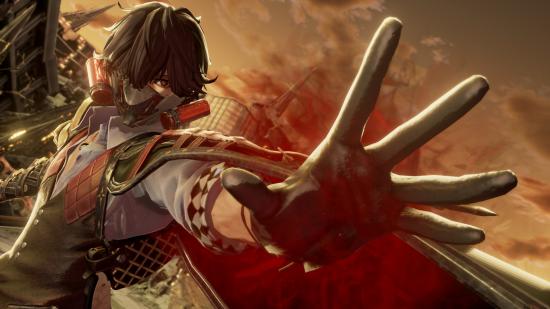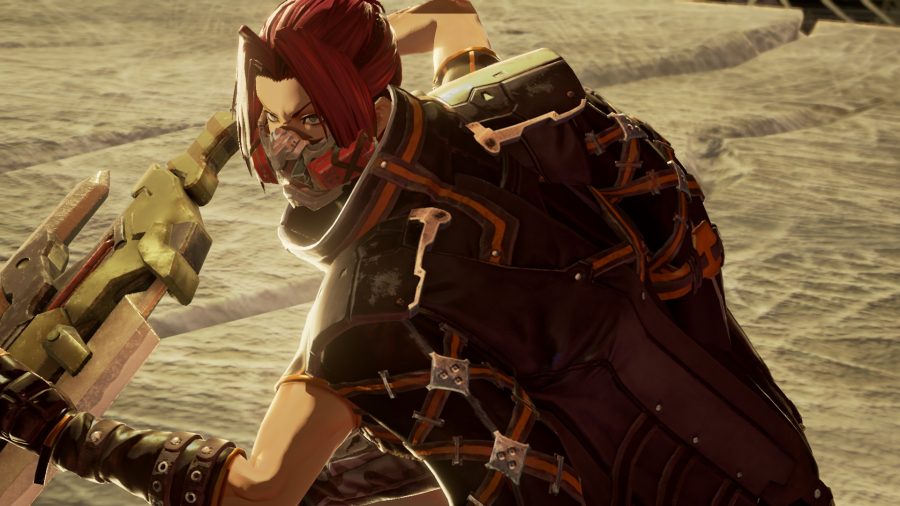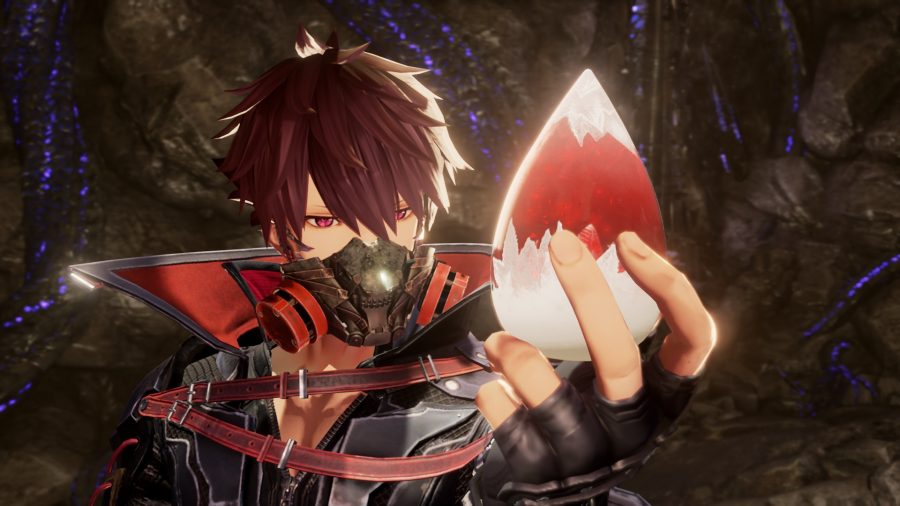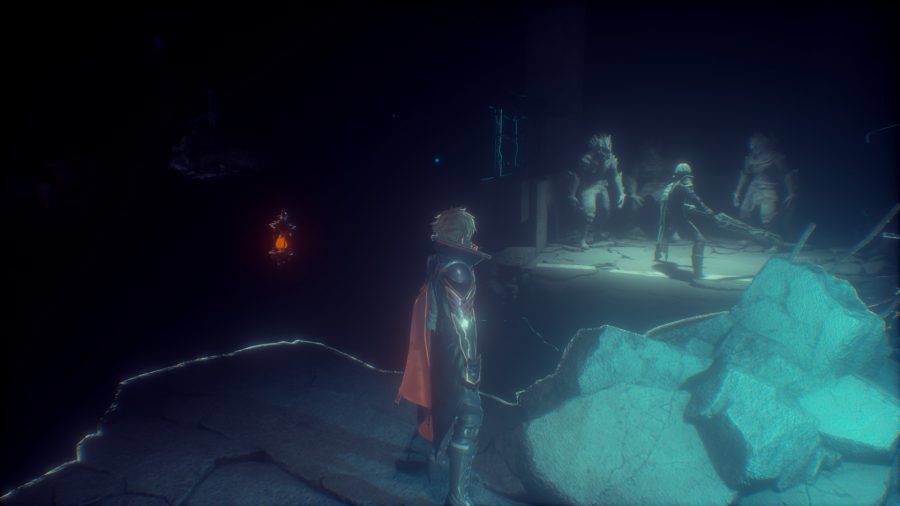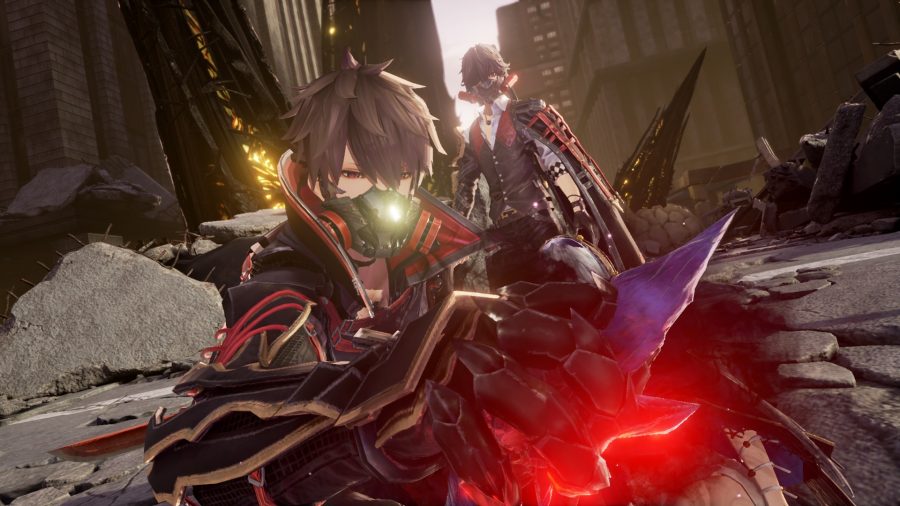Rather than gently dip you into its bloody world, Code Vein chucks a bucket of jargon and gameplay mechanics in your face almost immediately. It has a lot to teach and does so at blistering speed.
The first 20 minutes has me bewildered as I’m introduced to blood springs, gifts, blood codes, the lost, blood beads, revenants, a vital fluid known as ichor, void types, and all sorts of other universe-specific terminology. None of it makes the game easy to like at first. However, Code Vein is worth sticking with, as an elegant and customisable combat system soon emerges. Not that it’ll stop the game being compared to Bloodborne as it has already been a million times – and rightfully so.
In fact, the battle mechanics only invite more parallels between it and and FromSoftware’s Victorian gothic fantasy. Code Vein gives you heavy and light attacks, a dodge button that enables a rapid roll, and most of the armoury offers melee weapons – though some have limited firepower functionality too. Which is another way of saying it has guns.
It’s simple enough, but within those few moves are nuances that can only be known after several hours of playtime. What I rapidly learn while stabbing my way through Code Vein’s first level is that succeeding in a fight isn’t about complex techniques or sheer brute force – it’s about timing, flow, and patience.
Holding back is as important as charging in. Picking the right moment to strike, block, and counter is essential, while finding momentum within those moves even more so. To be consistently victorious it appears you need to spend plenty of time upgrading weapons, tinkering with the special attacks known as ‘gifts’, and picking armour that complements your fighting style.
When you get it right, the enemies fall quickly, and it feels great. But mistime a single block and you can be torn to pieces in seconds. If you do die, you’re sent back to a checkpoint that might see you having to repeat several difficult scraps.
In bloody blows and the consequences of death, Code Vein doesn’t do much to differentiate itself from Bloodborne – it offers exactly the same kind of challenging, nightmarish action-RPG fodder. But there’s also more to it than that. As I play I get a faint sense of Bayonetta’s eccentric energy, the flow of classic hack-and-slashes like Capcom’s Onimusha, and hints of core RPGs in the vein of Final Fantasy.
Code Vein’s main fight might be with Bloodborne, then, but there seems to be a good deal more focus on narrative detail and character development, which feels much more like the story-rich God Eater series – perhaps unsurprisingly given that it’s made by the same team.
You’re cast as a member of the Vein, a hidden subset of a wider group called The Revenant Society. The group are fighting to survive in a bleak dystopia that’s been ravaged by a mysterious force known as The Thorns of Judgment. Weaving all of the anime theatrics and strings of gore together is a vampire theme. Much of the narrative and mechanical focus – at least in the section I play – is on collecting and consuming blood; a lifeforce that will help you survive, activate checkpoints, deploy special abilities, and more.
The protagonist you play has suffered from serious amnesia, which gives you a blank slate to build on. The game essentially opens by thrusting a deep character customisation tool on you, and after the information-heavy tutorial, flings you out into a barren world occupied by hulking, hideous beasts. Initially, at least, the narrative concentrates on helping you understand who you are, who a mysterious female accomplice might be, and what exactly your role is in the post-apocalypse.
Where Code Vein really starts to deviate from FromSoftware’s own bloody RPG is its anime styling. This will likely divide people: some will delight in the aesthetic, others might be irked by how sexualised some of the characters are. From a design and technology perspective, it’s all certainly well realised. Sharply rendered characters pop against the dark, gritty backgrounds, and the lighting is typically impressive. This is all shown off when I arrive at a mansion that serves as an apparent hub for the lead cast and their associates, walking between different characters to learn more about the surrounding world.
On that point, Code Vein’s writing and performances walk a curious line between eccentricity and awkwardness. Some of its cast are deliberately peculiar, to the point that they almost seem like pantomime characters, prancing about with wild and over dramatic gestures.

The voice acting is also, at times, intentionally over-the-top and lands clumsily. But it’s not entirely out of place in Code Vein, as these peculiarities could all gel together nicely; Bayonetta proved a game’s tone can be absurd, silly, and beat-perfect at the same time.
But I can’t deny that Code Vein does feel a little stilted. Was that a deliberately awkward silence, or an ill-timed pause in conversational dialogue? Did that character really mean to over deliver on that line quite so much? It’s hard to tell. At times, it feels like Code Vein strives to be assertively playful and theatrical, but doesn’t quite have the confidence to commit. Its shifts from sincere to tongue-in-cheek can also be jarring. Again, it’s not a matter of straight-up bad writing or terrible acting. There’s a schlockiness that reminds me of House of the Dead, except that arcade classic was more obviously going for that, and therefore did it much better.
At a time when so many titles have explored the conventions established by Dark Souls, Code Vein is admirable for at least trying to take a distinct approach. A story-rich and challenging brawler than leans heavily into the customisation and dialogue traits of RPGs, all wrapped up in an anime aesthetic won’t be for everyone. But there’s a chance Code Vein will appeal to a big audience.
Related: Sink your teeth into the best vampire games on PC
It will take a few more hours of playtime to see if the combat and story come together, and if the game’s approach to character and performance becomes grating or endearing. It’ll also take a lot longer to truly understand what all the jargon means, but I’m intrigued enough to give it a go – there’s at least enough potential in Code Vein.
